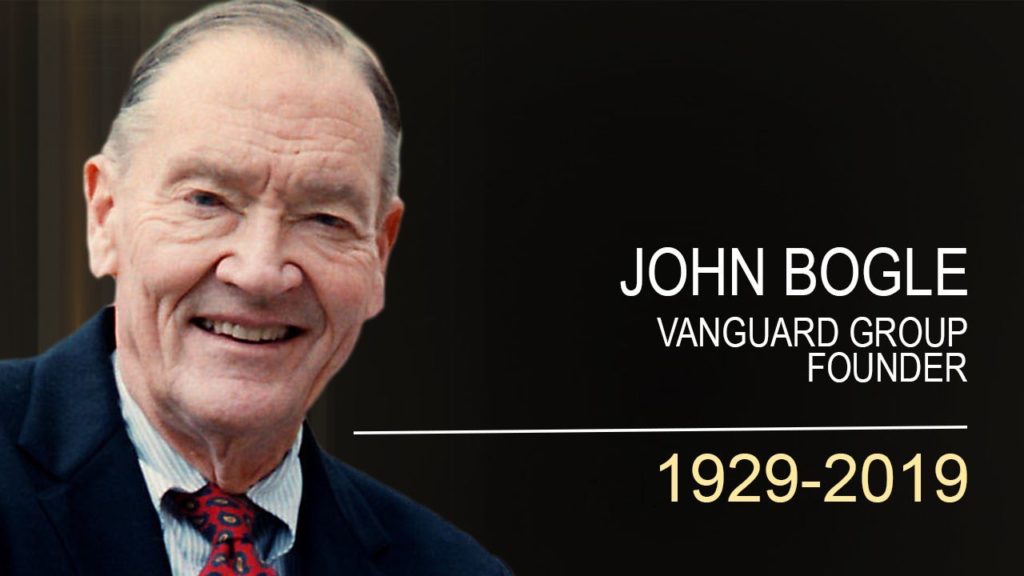On Wednesday, we lost John “Jack” Bogle, the founder of the Vanguard mutual fund empire and the inventor of the modern index fund. He was 89.

I doubt if there is a stock market in heaven. Something that evil and capable of producing human suffering really belongs in hell. But if there is a stock exchange in the next life, then Mr. Bogle should be its chairman. He did more than probably any single person in history to improve the odds for regular investors like you and me.
I’d argue that if there were a Mount Rushmore of finance, Mr. Bogle’s head should be on it. He was that influential. Before Bogle’s revolution, high management fees, shamefully high sales loads, and extreme tax inefficiency were the norm.
Today, the fees on many index funds are effectively zero. These are vehicles designed to be bought by cost-conscious investors rather than sold by predatory brokers looking to pocket a commission. You can largely thank Bogle for that.
You’ve probably already read plenty of eulogies to Bogle, so I’ll spare you another lengthy one here. Instead, let’s focus on some of the lessons learned from his long career.
No.1: Fees Matter
This is a big one.
Every dollar you spend in fees is a dollar that’s not available to grow and compound. And over an investing lifetime, it makes a big difference.
Let’s play with the math. Let’s say you invest $1,000 in two funds running identical strategies. The only difference is that one charges a fee that is 1% higher than the other. So, after fees, one returns 9% per year and the other returns 10%.
After 20 years, the fund with the after-fee return of 9% per year would grow to $5,604. Not too shabby. But the fund with the after-fee return of 10% would be worth $6,727, more than 20% higher.
This doesn’t mean that fee minimization is the only thing that matters, of course. If you’re getting a unique strategy or tailored advice, a “high” fee might be worth every penny. But to the extent you can eliminate fees, you obviously should because the savings compound over time.
No.2: Buying and Holding (Usually) Makes Sense
Bogle was proud of his invention, the index mutual fund, which he unveiled in 1975. But he was always a little skeptical of ETFs, even though his firm would eventually become a major player in that space.
While ETFs share the low-cost structure of index mutual funds and some of the same tax benefits, they tend to be used very differently. Unlike mutual funds, which can only be traded once per day, ETFs trade instantly throughout the day. This encourages excessive trading and a casino mentality. And that can lead to lousy returns and unnecessary capital gains taxes to pay.
Index investing worked because it was a long-term strategy. When you buy an index fund, you give up on trying to beat the market. You are the market. And over most long-term time horizons, being the market is just fine.
This doesn’t mean that Bogle was a proverbial Dr. Pangloss who always believed everything was hunky-dory and that stocks always shot up to the moon. In recent years, Bogle publicly stated many times that he expected stock returns to be in the ballpark of 4% per year at best over the next decade.
I’m less ideological than Bogle. I agree with him that indexing is a good strategy most of the time. But I’m not willing to completely throw active strategies out the window. At a time when stocks are priced to deliver lousy returns and the Fed is sucking liquidity out of the system, having more of your assets in active strategies (or, in my neck of the woods, high-yield income investments) makes sense. Passive indexing makes more sense when stocks are cheap priced to deliver high returns over the following years.
We’ll get there again. But we’re not there today.
No.3: Be Independent and Stick to Your Guns
When Bogle first proposed his idea for an index fund, most of his colleagues thought he had lost his mind. To them, a manager had to be paid to do something. Passively following an index seemed absurd.
Of course, as history would prove, Bogle was a visionary. He understood that the stock market had become increasingly hard for large for large-cap managers to beat. They couldn’t beat the market because, due to their size and clout, they had effectively become the market.
It should have been obvious, and Bogle wasn’t the only or even the first to notice it. But he was the first to do something about it, launching an index fund and taking on the entire Wall Street establishment in the process. And as a result, we all invest and trade in the new world he helped to create.
Rest in peace, Mr. Bogle. And on behalf of all investors, thank you.
This article first appeared on the Rich Investor.
